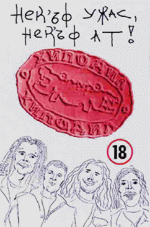History
After the massive success of Hipodil's previous album, the band had to use the momentum and offer a consistent second product. Though this time recording and production work were better, Hipodil cleverly chose to copy the winning formula of their debut instead of searching for a new direction. Yet, Hipodil vocalist and frontman Svetoslav Vitkov put a lot of references to his favourite heavy metal influences and especially Slayer in the record. The others in the band however did not like his ideas about the projected style of the album and this ignited a quarrel, which almost led to Vitkov's departure from Hipodil.
As the band had not enough time to work on their far less-than-perfect music skills after the extensive national tour in support of Alkoholen delirium, they put their money on more explicit lyrics, based on a broader range of topics which Bulgarian society at the time offered in abundance. They also changed their label and moved to Riva Sound.
In early 1995, Hipodil launched a long national tour to support the album which took them to some 20 cities across Bulgaria. During most of the tour, vocalist Svetoslav Vitkov suffered from sore throat and, reportedly, on many dates guest keyboard player Ventsislav Mitzov backed him heavily with the vocal parts.
Commercially, the album was very successful, though it did not produce any radio hits and no videos, chiefly due to the obscene lyrics. No official sales figures were ever released, a usual practice in Bulgarian music industry.
Nek'uf ujas, nek'uf at was released on audio cassettes only and was never re-released on a CD though some tracks were included in the band's greatest hits compilation Tu'pest in 1999 and its sequel Tu'pest 2 in 2009. Presently, the album is out of print and new copies cannot be purchased anywhere, however it is available for streaming and digital download on various sites. Amazon also offers print-on-demand CDs of the album.

The music of Bulgaria refers to all forms of music associated with the country of Bulgaria, including classical, folk, popular music, and other forms.
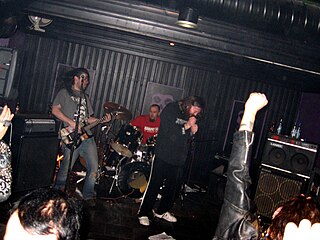
Anal Cunt, also called AxCx and A.C., was an American grindcore band that formed in Newton, Massachusetts, in 1988. From its inception, the band underwent a number of line-up changes and never had a bassist. The band, known for its flippant and noisy musical style as well as controversial lyrics, released eight full-length studio albums in addition to a number of compilations and extended plays. Anal Cunt disbanded in 2011 after the group's founder and frontman, Seth Putnam, died of a suspected heart attack.
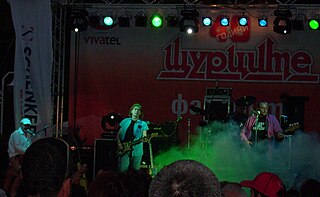
Shturcite, sometimes romanized as Shturtsite, was a Bulgarian rock group. They were one of the most successful bands in Bulgaria during the 1970s and 1980s and still have many fans. The band broke up once in 1990, reformed in 1997, and disbanded again in 2013. The group has been characterized as "Bulgaria's answer to The Beatles".
Hipodil was a Bulgarian rock band, founded in the late 1980s in Sofia by four classmates from the local Mathematics High School.

Alkoholen Delirium is the debut album of Bulgarian rock band Hipodil, released in 1993 under the Unison-RTM label. Although some tracks were included in the band's Tu'pest compilation in 2000, the album was only released on audio cassettes.

S gol v rukata... is the third studio album by the Bulgarian rock band Hipodil, released in 1996 under the Riva Sound label. The album marks a slight departure from the established musical style of the group, with many experiments and new influences including plenty of ska motifs. The most important change however was the lack of openly "funny" songs which probably was provoked by the deteriorating economic situation in Bulgaria, the galloping inflation and the rise in the organised crime at the time. S gol v rukata... never reached the success of Hipodil's previous effort Nekuf ujas, nekuf at or of their next album Nadurveni vuglishta.
Epizod is a Bulgarian heavy metal band formed in 1983 in Sofia. The first songs of the band were inspired by the French poet François Villon. Epizod are famous in Bulgaria for their concerts which include theatre, an Orthodox church choir, and an ensemble for Bulgarian folk songs and dances.
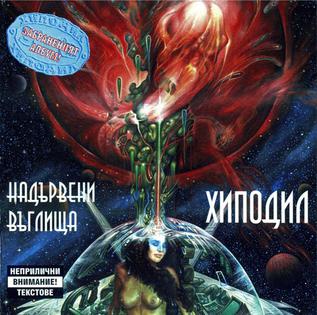
"Nadurveni vuglishta" is the fourth album by the Bulgarian rock band Hipodil, released on 25 November 1998 under the Riva Sound label, the band's fourth with the company. The name is a pun – in Bulgarian Nadurveni vuglishta means "Horny charcoal", but if written separately, as in Na durveni vuglishta, it will still sound like the first version, but the meaning will be quite different – "Roasted on charcoal".

Indira Radić is a Serbian pop-folk singer. She has established herself on the music scene of the former Yugoslavia and Bulgaria and sings almost exclusively in her native tongue. In the period from 1992 to 2015 she released 16 albums mixing pop, dance and traditional folk elements. This hybrid style, described as pop-folk, brought her success throughout the region with songs like "Ratovanje" that incorporated Indian elements.

"Agadoo" is a novelty song recorded by the British band Black Lace in 1984. "Agadoo" peaked at number two on the UK Singles Chart, and spent 30 weeks in the top 75. It went on to become the eighth best-selling single of 1984 in the UK, despite not being included on the playlist for BBC Radio 1 because it "was not credible".

Uspavanka za Radmilu M. is the sixth studio album by the Yugoslav rock band Bijelo Dugme, released in 1983.
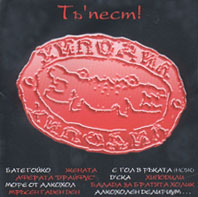
Tu'pest is a greatest hits compilation of the Bulgarian rock band Hipodil, released in 2000 under the Riva Sound label, the band's fifth and last release with that company. The name is a pun - from tup - Bulgarian for "dumb", and -est, the superlative suffix in English as in "the best".

Krasnaya Plesen, is a Russian punk rock group based in Yalta, active from 1989 to this day and having released 71 full albums. The name of the band is a mockery on the term Krasnaya Presnya. Presnya is a name of a neighbourhood in Moscow that saw uprisings during the Russian Revolution of 1905, and during the Soviet era was a popular name for factories and other organizations.

Riblja Čorba is a Serbian and former Yugoslav rock band formed in Belgrade in 1978. The band has been one of the most popular and most influential acts of the Yugoslav and Serbian rock scene.

Nebojša Krstić is a Serbian media personality, political commentator, former musician and physician. He is also a former public relations advisor to the office of the President of Serbia, appointed by Boris Tadić. Currently, Krstić is a strong supporter of the President of Serbia Aleksandar Vučić and his ruling Serbian Progressive Party.
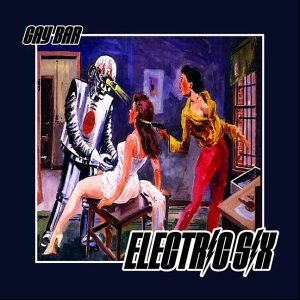
"Gay Bar" is a song by American rock band Electric Six. Written by band member Tyler Spencer, under the pseudonym Dick Valentine, it was released on June 2, 2003, as the second single from their debut studio album, Fire (2003). While both the song and music video received significant airplay, lyrics mentioning war were edited due to their possibly offensive nature, since the song made its air debut at the start of the Iraq War.

Hora ot naroda is the fifth and final album by Bulgarian rock band Hipodil, released on 4 December 2000.
Svetlio & the Legends, also referred to as Svetlio Hipodilski i Legendite, is a Bulgarian alternative rock band, formed in 2007 by former members of Hipodil.

Nanowar of Steel is an Italian comedy heavy metal band. Their name is a pun on the metal bands Manowar and Rhapsody of Fire, and represents their tendency to satirize "true metal", the primary focus of their music. Their work mainly aims to make humorous references to and jokes about the genre, often parodying the way in which power metal bands are perceived to take themselves very seriously.
Nili "Nelly" Markova Rangelova is a Bulgarian pop singer from the town of Montana.
